Thanks for your support! If you make a purchase using our links in this article, we may make a commission. And, as an Amazon Associate, I earn from qualifying purchases. See the full disclosure here.
Updated April 12, 2024
While touring and reviewing RVs this past year, we saw most 2024 RV models using 12-volt refrigerators rather than propane models. But we still are often asked by folks with used RVs: How long will an RV fridge run on propane?
A single 20-pound tank of propane will last most trailers a month. During this month, it will power simple things like your water heater, cooking tools, and refrigerator.
This is longer than a battery will be able to power your RV fridge on average. However, it is not precise because the length is affected by the size of your RV, fridge, and a few other major factors. So, you will need to account for those things once you have the specifications of your RV.
Now that you know how long you expect propane to power your RV fridge, we will explain how an RV fridge works. Additionally, we will look at how much propane one of these fridges uses.
Then, we will look at ways to reduce the amount of propane your RV fridge uses. Once you have all that information, we will answer a few more questions, including whether you need a battery to run your RV fridge on propane.
We know that if you are new to the world of RVs, you probably have a lot of things on your mind. So, we thought it would be a good idea to help you out by looking at a few of the best RV refrigerators on the market. You might not find the perfect fridge for you, but the products we feature should give you an idea of what to expect in other options in the future.
How Does an RV Fridge Work?
Before you familiarize yourself with an RV fridge, you might think it works the same as a residential fridge. However, this could not be further from the truth. Your home fridge uses a compressor, and your RV fridge does not have a compressor or any moving parts to cool things down. Instead, it is an absorption refrigerator.
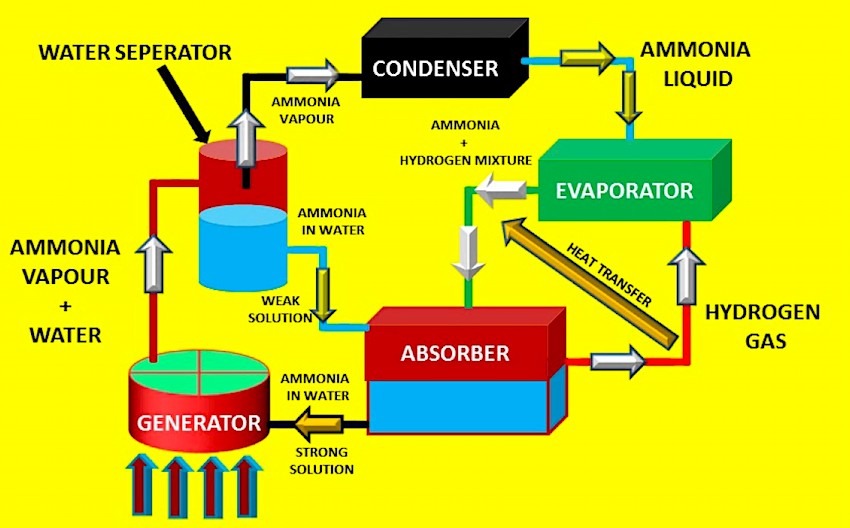
To keep things basic, an absorption fridge uses a flame to heat a combination of ammonia, hydrogen, gas, and water. The heat causes chemicals to evaporate, and the condensation from them cools the fridge.
If you are using shore power or a generator, the heat is produced by an element. However, if you are using LP gas, it is used to create the flame and heat the chemicals. Modern RV fridges will be set to automatically between LP gas or electricity depending on which is plugged in at the time.
How Long Does It Take For An RV Fridge To Get Cold?
How long it takes an RV fridge to get cold depends on the fridge and how it’s powered. It also depends on the surrounding temperature and the internal temp of the fridge when you get started. If a 12v Dometic fridge is at room temperature, reaching nominal refrigeration temperatures may take several hours.
Much larger RV fridges may take hours to cool down to efficient levels. However, you don’t have to plug an RV fridge in and walk away to play the patience game. There are things you can do to expedite the process.
- Stack bags of ice inside the fridge
- Avoid opening the door
- Make sure the fridge is surrounded by air-conditioned temperatures
- Fill it with cold items
- Make sure your RV is level
- Turn a box fan on and point it at the fridge while it’s cooling
- Purchase and install an internal fridge fan
- Make sure it’s empty (excluding ice bags and cold items)
With some or most of the above tips, you can significantly reduce the time it takes for the RV fridge to reach its optimal internal refrigeration temperatures.
Do All RV Fridges Run On Propane?
Absorption refrigerators, commonly found in RVs, can run on multiple power sources, including AC, DC, and LP Gas. While they can operate on propane, they often require a small amount of electricity for functions like the control board, igniter, and thermostat.
Compressor refrigerators are another type of RV fridge that runs on electricity. These refrigerators use a compressor to cool the fridge instead of ammonia and heat-like absorption refrigerators.
Are Propane RV Fridges Safe?
Propane refrigerators are commonly used in RVs due to their reliability and ability to operate without much electrical power during travel.
However, propane fridges can cause some safety concerns if they are not correctly installed and maintained. It’s crucial to understand their operation and adhere to safety measures.
Propane fridges cool by burning liquid propane and transferring heat to an evaporator coil, which cools the circulating refrigerant gas, absorbing heat inside the refrigerator.
A critical safety measure is ensuring proper ventilation to prevent carbon monoxide buildup, a toxic gas produced when propane burns. Adequate airflow allows any carbon monoxide to escape, ensuring safety inside the RV.
Regular maintenance is also vital for safety. Have a professional inspect the fridge annually for leaks or issues, and follow the manufacturer’s guidelines for cleaning and upkeep.
Monitoring propane levels is crucial to avoid running out unexpectedly, with some fridges featuring built-in gauges for convenience.
Proper operation is critical, especially with older models that might require manual lighting. Always consult the user manual for safe startup and shutdown procedures.
When transporting or storing propane tanks, ensure they are secure and upright to prevent leaks. And be sure to turn off the propane while driving to avoid pressure-induced leaks.
How Much Propane Does an RV Fridge Use?
Most newer RV fridges tend to be more thermally efficient than older options. As a result, a newer RV fridge will cost less to run over time. However, size also increases the overall energy demand.
Generally, a newer RV fridge with around 10 to 12 cubic feet of internal volume will consume roughly 1.5 pounds of propane per day. That translates to roughly 1400 BTUs per hour. That being said, a few things can improve or reduce the RV fridge’s performance.
How Can I Reduce the Amount of Propane My RV Fridge Uses?
Energy efficiency is incredibly important when you are living and traveling in an RV. Failing to be efficient can lead to a very expensive energy bill. Fortunately, you can do a few things to decrease the amount of propane burned by your RV fridge.
RV Fridge Cooling Fans
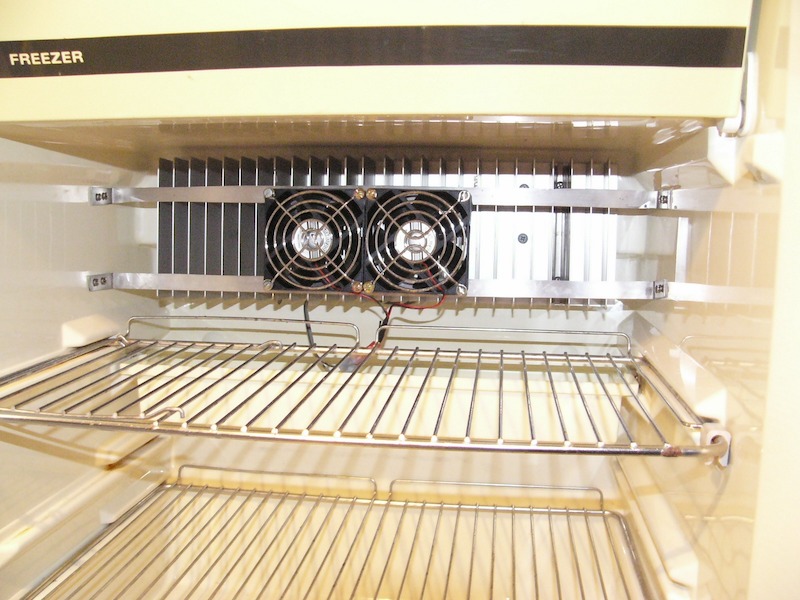
Air circulation is a major issue in RV fridges because they do not have a compressor. As a result, you could install RV fridge cooling fans inside your fridge to ensure that airflow is kept up.
These fans essentially help drive added cool air from the freezer through the refrigerator system. This will ultimately reduce the cooling load on the system. Depending on how packed your fridge and freezer are, you might be able to improve thermal efficiency by as much as 50 percent.
RV Fridge Vent Fan
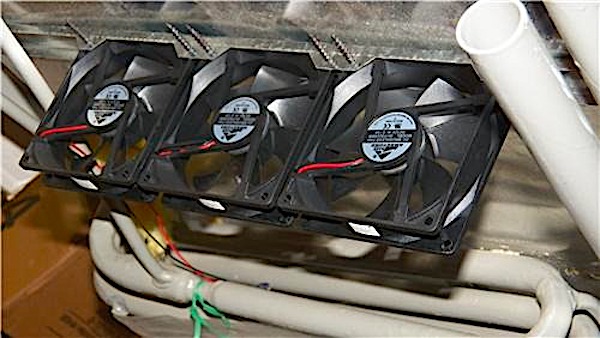
A second fan that you can add to your RV fridge that will help thermal efficiency is a vent fan. However, unlike a cooling fan, a vent fan does not go inside the fridge. Instead, it goes outside it.
The purpose of an RV fridge vent fan is to eliminate hot air around the fridge. When hot air accumulates around a fridge, it makes it so that the fridge needs to work harder to keep everything inside it cold.
As a result, your fridge will work harder and burn more propane to maintain the desired temperature. However, if you have a vent fan that eliminates surrounding hot air, it will not need to work as hard.
Be Sure Your RV is Level
Absorption refrigerators perform best when they are sitting on level ground. This is due in large part to the gravity feed of the cooling system’s fluids. When your RV is parked on uneven ground, it will slow the internal fluid cycling process.
The longer it stays on an uneven level, the more inefficient it will be, and the more likely it is to suffer a significant mechanical meltdown. As a result, it is very important to check the level of your RV after you park. Otherwise, you could have some major issues in the very near future.
Pre Cool Items Before Loading Them into an RV Fridge
One easy way to improve the efficiency of your RV fridge is to pre-cool your food before putting it in the fridge. You can do this by putting it in an icebox for a short amount of time before you add it to the fridge.
Alternatively, add cool food before you add anything that might be warm or hot. Having cold items in your fridge will further reduce the thermal load on the system. Additionally, if you have room to spare, you can add cold packs to the shelves to help lower the temperature even more.
What Size Are RV Propane Tanks?
The most common RV propane tank sizes are 20 lbs to 30 lbs. However, very small travel trailers and teardrops are more likely to have 10-lb tanks and smaller onboard. They don’t get much bigger than that, mostly because most RVers can handle 10-lb to 30-lb tanks without aid.
Depending on the floor plan and exterior features, some RVs can hold multiple propane tanks. Of course, RV owners can always make modifications that allow for more propane, like adding solar or extending a battery bank.
Can You Add A Propane Tank To An RV?
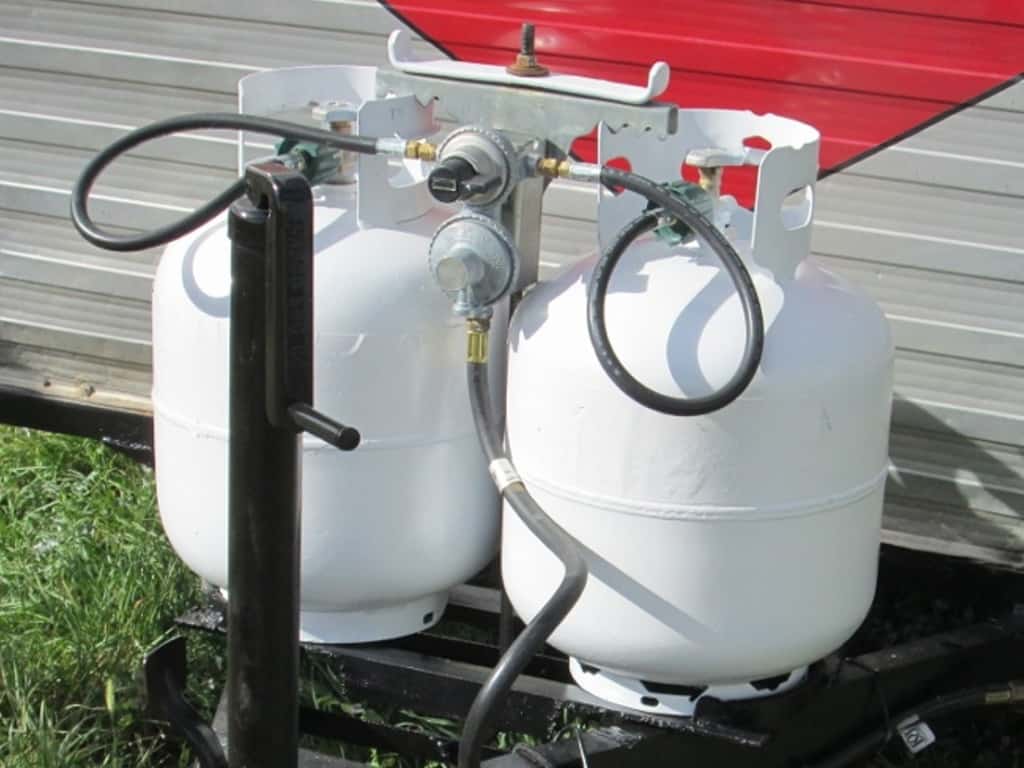
You sure can, as long as it’s viable and safe. Some of the “tweener” RVs (RVs that are not quite big enough to necessarily need an extra but might run into a situation where one is necessary) out there are easier to modify than the little teardrops.
You’ll need a regulator to switch from the empty tank to the full one. You’ll also need to extend the rack for holding them, whether that means building something yourself, having it professionally done, or purchasing an extra rack and installing it yourself.
Do I Need a Battery to Run My Refrigerator on Propane?
You might think that since your fridge is running on propane a battery is not required. However, since all modern RV fridges have a control board that acts as the brain of the unit, a battery is required to run the control board.
Depending on the fridge’s make and model, it will require a different voltage to run, but it will also require a battery. The control board requires battery power to run, and you need a battery for ignition. In most cases, it does not need to be incredibly powerful, but you will need a battery.
Can I Drive or Tow My Camper with My RV Fridge on Propane?
Now that you have your RV fridge all set up and ready to go, you are probably wondering whether it is safe to drive with it running. The short answer is yes. You can tow with the fridge running on propane, but there are risks you will need to accept.
Firstly, as we mentioned above, RV fridges work best when level. When you are driving, the level will change constantly by small amounts. As a result, the efficiency of your RV fridge will be out of whack.
Then there is a small risk that while towing your camper or driving your RV there could be a fire or explosion. You have to keep in mind that you will be driving with an open flame. While it is contained and very low risk, there is always a risk that something could go wrong when a fire is involved.
Typically, you will be able to drive without any issues, but if something out of the ordinary happens, like a tire blowing out, there could be a propane line rupture or leak. If that leak comes in contact with fire, then there could be an explosion. So, while you will probably be fine, you need to be aware of the risks.
How Long Will an RV Fridge Run on a Battery?
Although times will vary depending on the battery and fridge, the average RV fridge will run for 8 to 10 hours with the batteries on. When plugged into shore power your house batteries will be charging so the battery will last as long as you are plugged in.
What Are the Best RV Refrigerators?
Now that you know how RV fridges are powered, you need to figure out which one to purchase. Several options are available, all of which have pros and cons. Here we compiled a list of four excellent RV fridges for you to choose from.
1. 6 cu. ft. Dometic Americana II Refrigerator with Fan DM2672RBF1
The Dometic Americana II provides the ideal cooling solution for life on the road. It has two extra wide crisper bins with built-in carry handles for your convenience. Its ergonomic integrated locking door handles keep contents safe in transit. Additionally, it has a solid steel construction that makes it more durable.
This RV fridge has two operation methods: LP gas or 110 volts AC. The electronic controls allow you to switch between the two with ease.
Inside the fridge, you will enjoy the flexible shelving systems that adapt to your food storage needs. It also comes with LED lights that increase interior brightness by 30 percent.
2. 7 cu. Ft. Dometic RM3762RB Double Door RV Refrigerator
This RV Fridge from Dometic has intuitive, self-locking door handles. It also comes with a flush-mounted interior light that ensures a good view of everything inside the fridge. Four interior fresh food shelves can be used for extra storage.
Additionally, it comes with an eye-level LED temperature display so you can monitor the temperature and ensure that everything is running correctly.
3. 8 cu. ft. Americana II Plus Refrigerator DM2882RB1
This RV fridge is another one of the best options for you on the market. It provides eight cubic feet of storage while weighing 143 pounds. LED lights inside the fridge increase visibility and brightness by 30 percent.
Additionally, you can choose a left or right door swing to suit your preferences. A flexible shelving system also adapts to your food storage needs. The doors are edge-to-edge with large ergonomic handles.
4. Norcold Polar 3-Way AC/LP/DC 7 cu. ft. Refrigerator with Cold Weather Kit
This RV fridge from Norcold offers an upgraded appearance with enhanced and modern styling. It has taller door panels that provide a more built-in look, while hidden liner, hinges, and recessed door handles create a more streamlined look.
Additionally, it has an upgraded control panel that features an LCD display, adjustable thermostat, and mode selection. There are no buttons or switches that you need to worry about. Finally, the fridge includes cold-weather capability down to 0 degrees Fahrenheit.
Can You Replace A Propane RV Fridge With Electric?
Yes, replacing a propane RV fridge with an electric one is possible. However, some essential factors must be considered before making the switch.
Electrical Power: Your RV needs enough power to support an electric fridge. You should upgrade your RV’s electrical system or add more batteries or a generator.
Size and Dimensions: Electric fridges are larger than their propane counterparts. You may need to adjust your RV’s cabinetry or find a smaller electric fridge that fits within the existing space.
Extended Use: If you plan to use your RV for long periods without access to electricity, a propane fridge could be more suitable. These fridges can operate on propane gas for an extended duration, making them ideal for remote camping.
Maintenance and Repairs: Electric fridges can be more complex and require specialized repair technicians. Propane fridges are easier to maintain and repair, which is a plus if traveling to remote areas where specialized help may not be readily available.
Cost: Electric fridges may have a higher initial cost, but they often have lower operating costs than propane fridges. But remember, the savings in operating costs will depend on how frequently you use your RV and its electricity consumption.
Now You Know How Long Your RV Fridge Can Run on Propane
Now that you have the answer to the question of how long an RV fridge will run, we hope you are ready for your next trip. We know there is a lot of information to absorb, but it should all be helpful as you move forward.
RV fridges require more maintenance than residential fridges, so you need to take the time to learn about them. Otherwise, you could be left in the middle of the woods with a non-functional fridge.
A 20-pound tank of propane will last you for about a month. However, you also need batteries for everything to run effectively. There are also things you can do to reduce the amount of propane burned per day.
You can install cooling and vent fans, level your RV, and pre-cool items before loading everything into your fridge. By doing these things, you will ensure that your RV is as efficient as possible.
Several RV fridges are on the market that you can purchase and place in your RV or camper. However, before you make a purchase, you need to figure out a few key things. Firstly, you need to decide how big a fridge you want.
This will largely depend on how long you will be traveling and how many people you are traveling with. Then, you need to figure out if there are any features that are important to you. This will help guide you towards the perfect RV fridge.
Do you have any other questions about your RV fridge? Are you interested in any of the products listed above? Where do you plan on going for your next vacation? Let us know in the comments!
Related Reading:
– What is a 3-Way RV Fridge and Should You Buy One?
– How To Keep Your RV Fridge Cold While Traveling
– Can RV Refrigerator Fans Make Your Fridge Cooler?
– Can You Put a Residential Fridge in an RV?
Mike Scarpignato – Bio
Mike Scarpignato created RVBlogger.com over five years ago in 2018 to share all we have learned about RV camping.
Mike is an avid outdoorsman with decades of experience tent camping and traveling in his 2008 Gulf Stream Conquest Class C RV and 2021 Thor Challenger Class A motorhome.
We attend RV Shows and visit RV dealerships all across the country to tour and review drivable motorhomes and towable trailers to provide the best evaluations of these RVs in our blog articles and YouTube videos.
We are 3/4-time RVers who created RVBlogger.com to provide helpful information about all kinds of RVs and related products, gear, camping memberships, tips, hacks and advice.


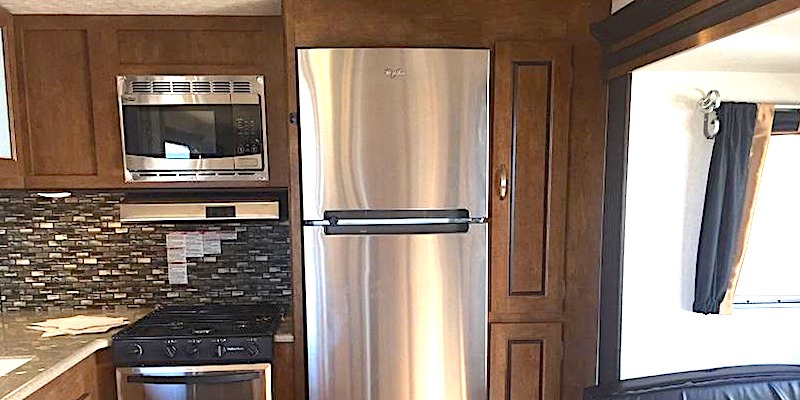
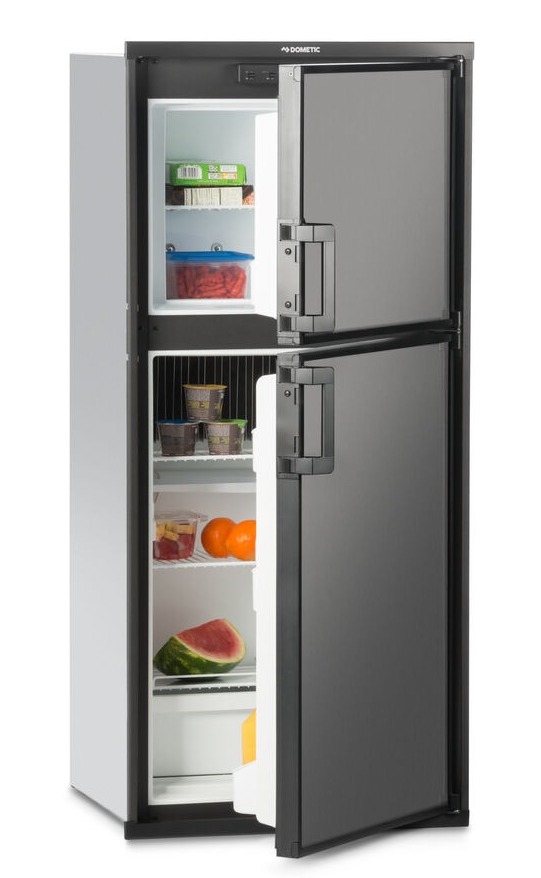
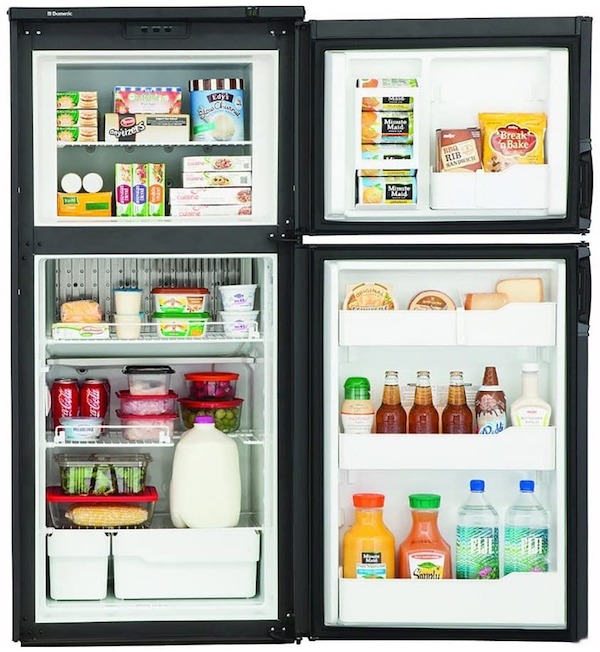
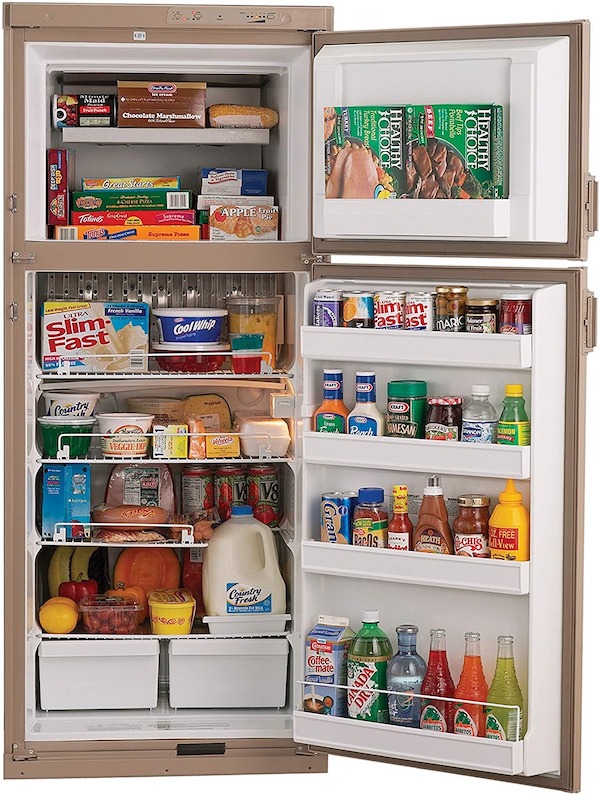
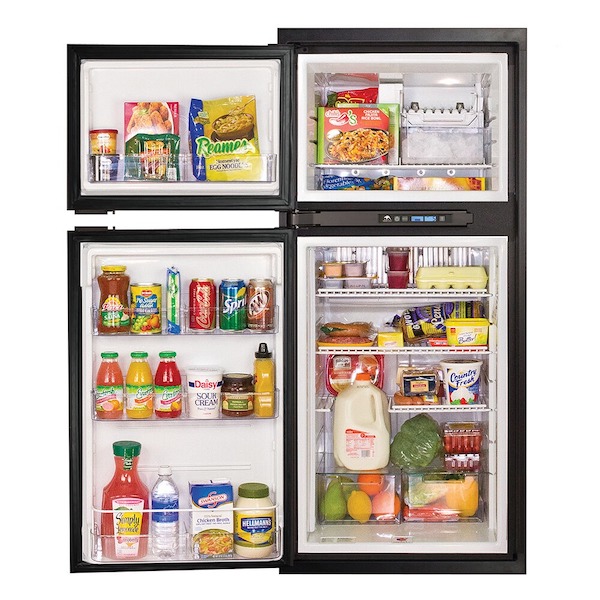
I have an Aliner Classic 2013 with a small fridge. How many days can I dry camp w/the fridge running on just the propane and battery?
There is one very important item missing from the list: holding open the door of an absorption refrigerator for one minute will require an average of THREE hours for the refrigerator to regain the cold that was “let out”.
Quick in-and-out should always be the rule when retrieving items from an absorption refrigerator.
Will my RV fridge run on shore power only? (Without propane). And if so, it’s there a switch on it to use power only?
Thanks so much , I leant so much.
Regards
Sandiso SA CT
We have an Atwood refrigerator that uses hhelium. Does this replace the hydrogen that most others use? In the past year it has stopped working in the electric mode 2 times. The rv was out of level both times. The most recent time we were able to level the rv, but the refrigerator would not restart. We checked the fuses and propane supply. They were OK. As I was getting ready to go out and purchase a mini fridge I punched the power button on the door. The refrigerator came back on! It has run fine in both gas and electric mode fot 3 days now. I seem to remember reading some uncomplimentary articles about Atwood units. Ours is the only helium one I’ve ever seen.